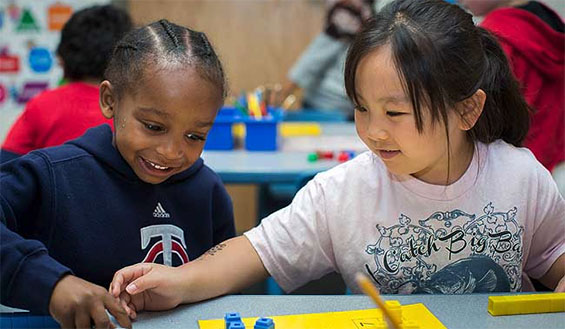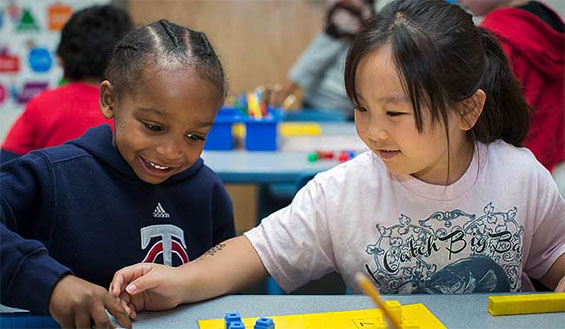
A new report suggests that accountability pressures have reached down through the elementary grades, causing kindergarten to become more focused on academic skills and less centered around opportunities for play.
The paper, “Is Kindergarten the New First Grade?” looks at public school kindergarten classrooms between 1998 and 2010 in two separate data sets representative of the entire nation. Authors Daphna Bassok, Scott Latham, and Anna Rorem write that “substantial changes” were found in each of the five dimensions looked at for the study, including beliefs about school readiness on the part of kindergarten teachers, time spent on academic content as well as nonacademic, classroom organization, pedagogical approach, and use of standardized assessments.
The later years looked at for the study found kindergarten teachers spending more time on advanced literacy and math, instruction that was teacher-directed, and test-taking, while at the same time spending less time with art, music, science, and activities selected by the children. In general, teachers in this time frame were found to hold higher academic expectations of their students, not only during the school year but before entering kindergarten as well.
A separate report put out in 2009 titled “Crisis in the Kindergarten” suggested that kindergarten classrooms in the United States had been changing at a fast pace over the last 20 years, adding that “developmentally appropriate learning practices” which were centered around play and exploration were being replaced with academic skill building and tests. To combat this, the report recommended a “reversal of the pushing down of the curriculum that has transformed kindergarten into de facto first grade.”
In the same time frame, news outlets were discussing such a shift of focus in kindergarten classrooms, with stories told by teachers and parents alike pertaining to the increase in homework, worksheets, and early development of literacy skills. Despite this, very little empirical evidence has existed on the topic.
Authors for the new study state that although previous research has determined that early learning experiences are important in terms of life outcomes, it is unknown specifically what about the learning environment is most influential.
Debates currently exist among teachers, parents, and policymakers concerning the risks and benefits of focusing on academic content at an early age. While critics argue that young children are not developmentally ready to tackle such academic content, supporters point to research that suggests doing so supports future academic learning.
The report discovered that between 1998 and 2010, teachers increasingly believed that children should learn to read in kindergarten, rising from 31% to 80%. Additional increases were found in the number of teachers who thought parents should teach their children the alphabet prior to entering kindergarten, up 33 percentage points, as well as those who believed children needed formal reading and math instruction before kindergarten, up 30 percentage points.
“Overall, then, our results suggest a heightened emphasis on academic skills among kindergarten teachers in the later period but fail to show that teachers now value these skills over and above other school readiness skills.”
The authors go on to say that more research is needed to determine how these changes are impacting young children’s cognitive and social development, as well as to hold a better understanding of what is driving these changes.




